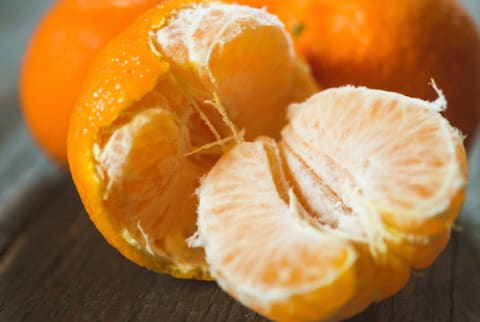Advertisement
5 Must-Eats For Your Healthiest, Shiniest Hair Ever


One of the biggest signs of good health is happy, shiny hair. Chemical products, pollution and poor nutrition can cause hair to be limp and damaged, but a good diet can really work wonders on your strands. As a child, my hair had trouble growing, but since I've changed my diet and really started paying attention to what I eat, my hair is noticeably thicker and grows much faster. It's really a bit of a miracle!
Here are five must-eats for your best hair ever, and two tips I've learned along the way.
1. Vitamins & Minerals
Vitamins and minerals — like iron and zinc — are essential for hair growth. Iron helps carry oxygen to hair follicles, and when there isn't enough (anemia), hair loss occurs. Zinc is responsible for shiny hair and when your body lacks ample amounts, your strands can look dull and even gray.
Luckily, these essential nutrients are fairly easy to get into your diet since they're found in so many delicious foods: quinoa, beans, nuts, lentils and oranges. If you're eating a varied, whole foods-based diet, you're already getting lots of this goodness into your body regularly.
2. Protein
Since a single strand of hair is composed mostly of protein, it's clear your hair needs protein to grow and flourish. If you're not getting enough protein in your diet, hair growth will stall (possibly even stopping) and you'll find that you're shedding a lot more hair than you're used to.
So eat up! Grains, nuts, beans, seed and leafy greens are excellent sources of protein. Superfoods like spirulina are awesome too. For example, spirulina contains about 60% protein, so it's great for healthy hair and super-easy to pop into your smoothie in the morning!
3. Healthy Fats
The other thing that we should include in your diet for our hair (and skin) is fat! Essential fatty acids can be found in avocados, nuts and coconut oil. It's essential that we consume these healthy fats because our bodies don't produce them naturally. Essential fatty acids have the ability to turn dry, brittle hair into a stronger and more luscious mane by nourishing from the root to strengthen hair as it grows.
4. Apple Cider Vinegar
This may sound strange but if you have a buildup of products in your hair that are causing your strands to appear limp and greasy, apple cider vinegar is the perfect, natural hair care product. Just mix equal parts apple cider vinegar and water, wash your hair like normal with shampoo and conditioner, then finish by rinsing it with the diluted ACV. Don't rinse it out; just leave the mixture in and let it work it's de-gunking magic. (I promise it doesn't smell once your hair is dry!)
5. Coconut Oil
The other miracle worker "ingredient" I use on my hair is coconut oil. I try to use it as a hair mask once a week and trust me when I say it's really amazing. Work a small scoop of coconut oil through the ends of your hair and leave it in overnight while you sleep. In the morning, wash it out in the shower and your hair will be shiny and bouncy all day. If you don't want to sleep in the hair mask (or are short on time but want those shiny strands), even a ten minute session will help!

Now for a couple of general tips on hair health:
1. Start with your gut.
It's all very well eating great food, but poor digestion can prevent the proper absorption of minerals and nutrients which will impact the foods' effectiveness on your skin, hair and health. Addressing any gut or digestions issues first can go a long way in helping you see the physical benefits of your good diet. Start by adding probiotics and probiotic food (like sauerkraut) to your diet every day.
2. Keep it natural.
Healthy eating really helps, but there are lots of other things you can do to help strengthen your hair. Using natural products that are more gentle on your hair and scalp are crucial, so if possible, avoid chemical-laden hair care products: they're full of rubbish that don't nurture your locks! I've found the best natural products are actually quite a lot cheaper than any fancy products and do a better job!